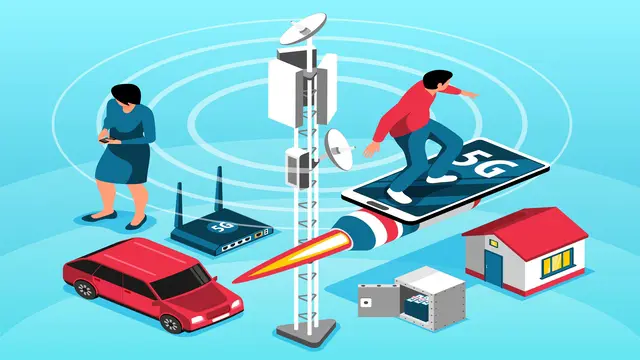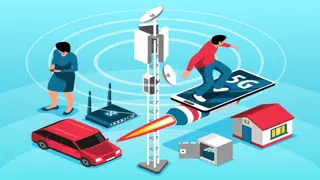
Telecommunications Engineering Level 3 Advanced Diploma
Update on 2023 | CPD Certified | Free Digital Certificate | Free Exam | Lifetime Access
Course Line On Demand
Summary
- Reed Courses Certificate of Completion - Free
- Tutor is available to students
Add to basket or enquire
Overview
Welcome to Telecommunications Engineering Level 3 Advanced Diploma, a comprehensive and engaging course designed to provide you with in-depth knowledge and practical skills in Telecommunications Engineering. Throughout this course, we will explore various aspects of Telecommunications Engineering and delve into its fundamental concepts, advanced techniques, and real-world applications.
Our primary objective in Telecommunications Engineering Level 3 Advanced Diploma is to equip you with a solid foundation in Telecommunications Engineering. Whether you are a beginner or an experienced professional looking to expand your expertise, this course will cater to your needs and help you achieve your learning goals.
During our journey together, you will have the opportunity to:
- Gain a thorough understanding of the core principles and theories that underpin Telecommunications Engineering.
- Acquire practical skills through hands-on exercises, projects, and real-world examples.
- Explore cutting-edge advancements and emerging trends in the field of Telecommunications Engineering.
- Prepare for future opportunities, such as further education, career advancement, or entrepreneurship, in the field of Telecommunications Engineering.
- Reflect on your learning journey, celebrate your achievements, and gain the confidence to excel in Telecommunications Engineering.
By the end of Telecommunications Engineering Level 3 Advanced Diploma, you will have gained a comprehensive understanding of Telecommunications Engineering and developed the skills necessary to succeed in this dynamic field. Whether you choose to pursue further education, enter the job market, or embark on entrepreneurial ventures, this course will lay a strong foundation for your future endeavours.
We are excited to have you join us on this educational journey, and we look forward to helping you unlock your full potential in Telecommunications Engineering Level 3 Advanced Diploma. Let's get started!
Why should you choose Course Line?
When it comes to quality education and professional development, Course Line stands out as one of the most prestigious learning providers. As a certified institution by UKRLP & CPD Group, we have a proven track record of excellence, having successfully taught over 20,000+ students and counting.
Certificates
Reed Courses Certificate of Completion
Digital certificate - Included
Will be downloadable when all lectures have been completed.
Curriculum
-
Disclaimer 01:00
-
Lecture 1: Advanced Principles of Telecommunications 15:00
-
Lecture 2: Network Protocols and Architectures 15:00
-
Lecture 3: Wireless Communication Systems 15:00
-
Lecture 4: Optical Fiber Communications 14:00
-
Lecture 5: Telecommunication Network Management 15:00
-
Lecture 6: Advanced Telecommunications Projects 12:00
-
Assessment 10:00
Course media
Description
Welcome to the course outline for Telecommunications Engineering Level 3 Advanced Diploma. In this comprehensive learning journey, we will explore the depths of Telecommunications Engineering, delving into its core principles, practical examples, and advanced techniques. Through a series of engaging lectures and exercises, you will gain the knowledge and skills necessary to excel in the field of Telecommunications Engineering Level 3 Advanced Diploma.
*****Telecommunications Engineering Level 3 Advanced Diploma Course Syllabus*****
Lecture 1: Advanced Principles of Telecommunications
- Lesson 1 - Introduction to advanced telecommunications concepts
- Lesson 2 - Digital signal processing and modulation techniques
- Lesson 3 - Error correction and data compression algorithms
- Lesson 4 - Spread spectrum and multiple access techniques
- Lesson 5 - Emerging trends in telecommunications technologies
Lecture 2: Network Protocols and Architectures
- Lesson 1 - TCP/IP protocol suite: in-depth analysis and applications
- Lesson 2 - Quality of Service (QoS) considerations in network design
- Lesson 3 - Virtual LANs (VLANs) and network segmentation
- Lesson 4 - Network security and encryption protocols
- Lesson 5 - Next-generation network architectures (5G, beyond)
Lecture 3: Wireless Communication Systems
- Lesson 1 - Cellular communication technologies: 3G, 4G, and 5G
- Lesson 2 - Antenna design and propagation in wireless networks
- Lesson 3 - Wireless network planning and optimization
- Lesson 4 - Mobile edge computing and Internet of Things (IoT) connectivity
- Lesson 5 - Case studies of successful wireless deployments
Lecture 4: Optical Fiber Communications
- Lesson 1 - Principles of optical fiber communication
- Lesson 2 - Fiber optic components and their functions
- Lesson 3 - Wavelength division multiplexing (WDM) and dense WDM (DWDM)
- Lesson 4 - Fiber optic network design and troubleshooting
- Lesson 5 - Future directions in optical communications
Lecture 5: Telecommunication Network Management
- Lesson 1 - Network monitoring and performance optimization
- Lesson 2 - Fault detection and management strategies
- Lesson 3 - Configuration management and version control
- Lesson 4 - Network scalability and capacity planning
- Lesson 5 - Introduction to software-defined networking (SDN)
Lecture 6: Advanced Telecommunications Projects
- Lesson 1 - Collaborative project: Design and simulate a complex telecommunications system
- Lesson 2 - Practical implementation of a telecommunications project
- Lesson 3 - Troubleshooting and debugging real-world telecommunications issues
- Lesson 4 - Presentation of projects and lessons learned
Assessment Process
Upon completing the Telecommunications Engineering Level 3 Advanced Diploma course, you will be required to undertake a multiple-choice evaluation in order to gauge your understanding of the material covered.
If you do not achieve the minimum passing score, you will have the opportunity to retake the assessment without incurring any additional cost.
Certification
After successfully completing this Telecommunications Engineering Level 3 Advanced Diploma course, you will get an instant Free digital certificate.
Who is this course for?
Telecommunications Engineering Level 3 Advanced Diploma is designed to cater to a wide range of individuals who are eager to enhance their knowledge and skills in Telecommunications Engineering.
This course is suitable for:
- Beginners in Telecommunications Engineering
- Professionals
- Students
- Career changers
No matter your background or level of experience, Telecommunications Engineering Level 3 Advanced Diploma offers a comprehensive learning experience that caters to your specific needs. Join us on this educational journey and unlock your potential in Telecommunications Engineering today!
Requirements
Requirements for the Telecommunications Engineering Level 3 Advanced Diploma course:
- No Prior Knowledge Required
- Basic Computer Skills.
- Internet access.
- Familiarity with English
Career path
Completing Telecommunications Engineering Level 3 Advanced Diploma course can open exciting career opportunities in various fields related to Telecommunications Engineering. Here are three potential career paths you can pursue after completing Telecommunications Engineering.
- Telecommunications Engineering Specialist
- Telecommunications Engineering Researcher
- Telecommunications Engineering Educator
Questions and answers
Currently there are no Q&As for this course. Be the first to ask a question.
Reviews
Currently there are no reviews for this course. Be the first to leave a review.
Legal information
This course is advertised on reed.co.uk by the Course Provider, whose terms and conditions apply. Purchases are made directly from the Course Provider, and as such, content and materials are supplied by the Course Provider directly. Reed is acting as agent and not reseller in relation to this course. Reed's only responsibility is to facilitate your payment for the course. It is your responsibility to review and agree to the Course Provider's terms and conditions and satisfy yourself as to the suitability of the course you intend to purchase. Reed will not have any responsibility for the content of the course and/or associated materials.


